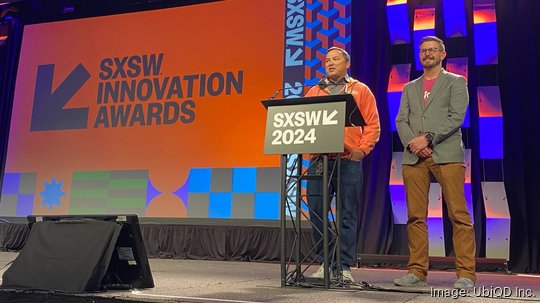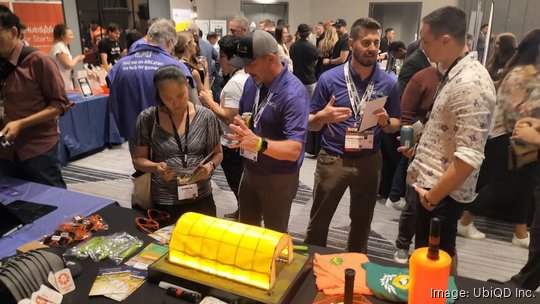
UbiQD's CEO Hunter McDaniel, left, and Matt Bergren, the Los Alamos startup's chief product officer, on stage at the SXSW Innovation Awards presentation.
Courtesy of UbiQD Inc.
With a new greenhouse technology and a rash of flyers and other promotional materials, Los Alamos-based
UbiQD Inc. hit the road to South by Southwest (SXSW), the sprawling Austin arts, entertainment, technology and music festival. While the New Mexico startup may have given out all its swag, it's not returning to the Land of Enchantment totally empty-handed.
SXSW, late Monday, announced the winners of its 2024 SXSW Innovation Awards, recognizing 14 technologies across 11 different categories, alongside a People's Choice Award and Best In Show winner. UbiQD's new greenhouse tech was one of those 14 technologies awarded.
It's a "very prestigious award,"
Hunter McDaniel, UbiQD's CEO, told New Mexico Inno on Tuesday. Hundreds of applicants were narrowed down to finalists in a slew of different categories, announced in late January.
UbiQD's technology fit into the WTF, or What the Future, category, which "collects futuristic projects that don't fit elsewhere,"
per SXSW's website. The four other finalists in the WTF category included an all-natural bedding tech from Munich, Germany; an AI-based tattoo tech from Austin; a light-sensitive textile tech from Cambridge, Massachusetts; and an algae-based performance materials tech from Salt Lake City.
The Los Alamos startup's own technology, called UbiGro Cover, uses its namesake quantum dots to increase the photosynthetic efficiency of greenhouse glass by integrating directly into greenhouse roofs. UbiQD developed the tech over the past two years and officially
rolled it out in November 2023.
Landing the award is a "big recognition" for UbiGro Cover, McDaniel said. "It sort of reinforces how innovative that product is."
While UbiQD had a presence at the sprawling Austin festival in previous years, McDaniel said 2024 was the first year the startup presented a full-scale demonstration of its tech. UbiQD demonstrated its UbiGro Cover product at a large tech showcase event held at the JW Marriott Downtown Austin, and at a smaller showcase event hosted by Austin-based startup organization Capital Factory.
McDaniel said "hundreds" of guests visited UbiQD's demonstration booths during both events — so many so that the gathered crowd reportedly caused a fire safety hazard. McDaniel and other UbiQD employees spoke with people who included corporate VCs, folks from Europe who traveled to Austin for the festival and others from New Mexico who also made the trip to Texas.
The company's technology "resonates" with people, McDaniel said, one reason he offered as to why UbiQD's booth attracted a large number of visitors. It helped, too, he added, that the startup's demonstration was "literally glowing," emulating how the tech responds to sunlight.

UbiQD employees talk to guests at one of the startup's booths. Its CEO said "hundreds" of people visited UbiQD's tech demonstrations.
Quantum dots, which provide the foundation for UbiQD's greenhouse and other products, are semiconductor nanoparticles that optimize light harvesting across various color spectrums. The Los Alamos startup applies the dots in a range of applications, including greenhouse film, windows and security inks.
UbiQD hopes to expand the manufacturing of those quantum dots in New Mexico this year. McDaniel, who founded UbiQD in Los Alamos in 2014,
told New Mexico Inno in November the company is in the early planning stages for a new manufacturing facility with about 50 times the capacity of its current space.
That new site would help meet a growing demand for UbiQD's products, McDaniel said, fueled in part by recent
Nobel Prize recognition for quantum dot technology. The startup has existing customers for its UbiGro Cover product in New Mexico, Arizona and New York and has a "backlog" of interested customers preparing for the spring growing season, he added.
Read the original article
here.
 UbiQD's CEO Hunter McDaniel, left, and Matt Bergren, the Los Alamos startup's chief product officer, on stage at the SXSW Innovation Awards presentation.
Courtesy of UbiQD Inc.
With a new greenhouse technology and a rash of flyers and other promotional materials, Los Alamos-based UbiQD Inc. hit the road to South by Southwest (SXSW), the sprawling Austin arts, entertainment, technology and music festival. While the New Mexico startup may have given out all its swag, it's not returning to the Land of Enchantment totally empty-handed.
SXSW, late Monday, announced the winners of its 2024 SXSW Innovation Awards, recognizing 14 technologies across 11 different categories, alongside a People's Choice Award and Best In Show winner. UbiQD's new greenhouse tech was one of those 14 technologies awarded.
It's a "very prestigious award," Hunter McDaniel, UbiQD's CEO, told New Mexico Inno on Tuesday. Hundreds of applicants were narrowed down to finalists in a slew of different categories, announced in late January.
UbiQD's technology fit into the WTF, or What the Future, category, which "collects futuristic projects that don't fit elsewhere," per SXSW's website. The four other finalists in the WTF category included an all-natural bedding tech from Munich, Germany; an AI-based tattoo tech from Austin; a light-sensitive textile tech from Cambridge, Massachusetts; and an algae-based performance materials tech from Salt Lake City.
The Los Alamos startup's own technology, called UbiGro Cover, uses its namesake quantum dots to increase the photosynthetic efficiency of greenhouse glass by integrating directly into greenhouse roofs. UbiQD developed the tech over the past two years and officially rolled it out in November 2023.
Landing the award is a "big recognition" for UbiGro Cover, McDaniel said. "It sort of reinforces how innovative that product is."
While UbiQD had a presence at the sprawling Austin festival in previous years, McDaniel said 2024 was the first year the startup presented a full-scale demonstration of its tech. UbiQD demonstrated its UbiGro Cover product at a large tech showcase event held at the JW Marriott Downtown Austin, and at a smaller showcase event hosted by Austin-based startup organization Capital Factory.
McDaniel said "hundreds" of guests visited UbiQD's demonstration booths during both events — so many so that the gathered crowd reportedly caused a fire safety hazard. McDaniel and other UbiQD employees spoke with people who included corporate VCs, folks from Europe who traveled to Austin for the festival and others from New Mexico who also made the trip to Texas.
The company's technology "resonates" with people, McDaniel said, one reason he offered as to why UbiQD's booth attracted a large number of visitors. It helped, too, he added, that the startup's demonstration was "literally glowing," emulating how the tech responds to sunlight.
UbiQD's CEO Hunter McDaniel, left, and Matt Bergren, the Los Alamos startup's chief product officer, on stage at the SXSW Innovation Awards presentation.
Courtesy of UbiQD Inc.
With a new greenhouse technology and a rash of flyers and other promotional materials, Los Alamos-based UbiQD Inc. hit the road to South by Southwest (SXSW), the sprawling Austin arts, entertainment, technology and music festival. While the New Mexico startup may have given out all its swag, it's not returning to the Land of Enchantment totally empty-handed.
SXSW, late Monday, announced the winners of its 2024 SXSW Innovation Awards, recognizing 14 technologies across 11 different categories, alongside a People's Choice Award and Best In Show winner. UbiQD's new greenhouse tech was one of those 14 technologies awarded.
It's a "very prestigious award," Hunter McDaniel, UbiQD's CEO, told New Mexico Inno on Tuesday. Hundreds of applicants were narrowed down to finalists in a slew of different categories, announced in late January.
UbiQD's technology fit into the WTF, or What the Future, category, which "collects futuristic projects that don't fit elsewhere," per SXSW's website. The four other finalists in the WTF category included an all-natural bedding tech from Munich, Germany; an AI-based tattoo tech from Austin; a light-sensitive textile tech from Cambridge, Massachusetts; and an algae-based performance materials tech from Salt Lake City.
The Los Alamos startup's own technology, called UbiGro Cover, uses its namesake quantum dots to increase the photosynthetic efficiency of greenhouse glass by integrating directly into greenhouse roofs. UbiQD developed the tech over the past two years and officially rolled it out in November 2023.
Landing the award is a "big recognition" for UbiGro Cover, McDaniel said. "It sort of reinforces how innovative that product is."
While UbiQD had a presence at the sprawling Austin festival in previous years, McDaniel said 2024 was the first year the startup presented a full-scale demonstration of its tech. UbiQD demonstrated its UbiGro Cover product at a large tech showcase event held at the JW Marriott Downtown Austin, and at a smaller showcase event hosted by Austin-based startup organization Capital Factory.
McDaniel said "hundreds" of guests visited UbiQD's demonstration booths during both events — so many so that the gathered crowd reportedly caused a fire safety hazard. McDaniel and other UbiQD employees spoke with people who included corporate VCs, folks from Europe who traveled to Austin for the festival and others from New Mexico who also made the trip to Texas.
The company's technology "resonates" with people, McDaniel said, one reason he offered as to why UbiQD's booth attracted a large number of visitors. It helped, too, he added, that the startup's demonstration was "literally glowing," emulating how the tech responds to sunlight.
 UbiQD employees talk to guests at one of the startup's booths. Its CEO said "hundreds" of people visited UbiQD's tech demonstrations.
Quantum dots, which provide the foundation for UbiQD's greenhouse and other products, are semiconductor nanoparticles that optimize light harvesting across various color spectrums. The Los Alamos startup applies the dots in a range of applications, including greenhouse film, windows and security inks.
UbiQD hopes to expand the manufacturing of those quantum dots in New Mexico this year. McDaniel, who founded UbiQD in Los Alamos in 2014, told New Mexico Inno in November the company is in the early planning stages for a new manufacturing facility with about 50 times the capacity of its current space.
That new site would help meet a growing demand for UbiQD's products, McDaniel said, fueled in part by recent Nobel Prize recognition for quantum dot technology. The startup has existing customers for its UbiGro Cover product in New Mexico, Arizona and New York and has a "backlog" of interested customers preparing for the spring growing season, he added.
Read the original article here.
UbiQD employees talk to guests at one of the startup's booths. Its CEO said "hundreds" of people visited UbiQD's tech demonstrations.
Quantum dots, which provide the foundation for UbiQD's greenhouse and other products, are semiconductor nanoparticles that optimize light harvesting across various color spectrums. The Los Alamos startup applies the dots in a range of applications, including greenhouse film, windows and security inks.
UbiQD hopes to expand the manufacturing of those quantum dots in New Mexico this year. McDaniel, who founded UbiQD in Los Alamos in 2014, told New Mexico Inno in November the company is in the early planning stages for a new manufacturing facility with about 50 times the capacity of its current space.
That new site would help meet a growing demand for UbiQD's products, McDaniel said, fueled in part by recent Nobel Prize recognition for quantum dot technology. The startup has existing customers for its UbiGro Cover product in New Mexico, Arizona and New York and has a "backlog" of interested customers preparing for the spring growing season, he added.
Read the original article here.






